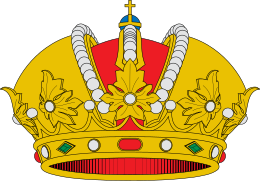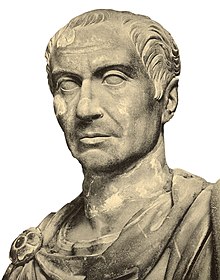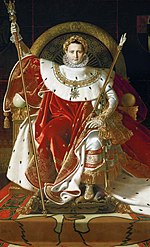Emperor
An emperor (from the Latin term imperator) is the sovereign monarch of an empire or a monarch who has other kings as vassals. It is the title of highest dignity, above the king, and its feminine equivalent is empress to refer to an emperor's wife (empress consort), mother (empress dowager), or a woman who rules in her own right (empress titular or reigning).
The Emperor of Japan is the only currently reigning monarch whose title translates as "emperor", though its original term, "tennō " (天皇), literally translates as "heavenly monarch".
History of the term
In the year 27 a. C., Octavian Augustus reunified the Roman world and established the political entity generally known as the Roman Empire, which replaced the Roman Republic. However, he did not dare to assume absolute power and thus break the political system of Rome, due to the example represented by the assassination of Julius Caesar in 44 BC. C., precisely accused by the senators of wanting to end republican civil liberties and return to the ancient and infamous Roman Monarchy. In this way he created the Principality, a political regime in which all republican positions and forms were maintained, but all the great public positions were assumed by the Princeps Civium ("the first of the citizens"). In this way, Octavio guaranteed effective control of the Imperium Romanum ("the territory controlled by Rome"). In practice, the most important title that the Princeps had was that of Imperator (commander or head of the army). This, as has been seen, did not prevent the Senate from "greeting" to other imperator.
During the first two centuries of Imperial Rome, rulers were usually referred to as princeps, (princes), since the political climate and peace favored the predominance of the civil function of the emperor. However, as a result of the Crisis of the 3rd century, when the command of the Empire passed into the hands of military leaders, the Roman monarch began to acquire a much more military aspect. In this way, the use of the title Imperator became general, and with the passage of time this title was identified with that of absolute lord and master of an empire.
The Fall of Western Rome
After the collapse of the Western Roman Empire in 476, the Eastern Roman Empire (commonly known as the Byzantine Empire) continued the Roman tradition, although it abandoned the Latin language and culture for the Hellenic one that predominated in the eastern territories. After the death of Justinian I, the claim of continuity with the Roman emperors was gradually abandoned, and Latin, until then the administrative language of the Byzantine Empire, was replaced by Greek. Thus, beginning with Heraclius in 610, the emperors of the East called themselves by the Greek term basileus, which means both king and emperor.. However, in the eastern sphere, the title of Tsar also began to gain strength, derived from the Latin name Caesar, and which was later applied to the Tsar of Bulgaria, to be taken at the time by the tsars of the Russian Empire, once Constantinople fell to the Ottoman Turks.
Although the Empire disappeared in the West, the Church of Rome claimed to be its continuation in the spiritual field. Initially, the Roman popes recognized the Byzantine emperors as continuators of the Roman imperial tradition, but the growing disagreements between the two, due to the continuous interference of the Byzantine emperors to force the papal elections and their lack of interest and inability to defend Rome from the barbarian invasions, made the papacy look to the growing political power of the Franks. In this way the popes called Pepin the Short to help him to end the threat of the Lombards, enthroning him as king of the Franks in reward.
His son Charlemagne was crowned Emperor of the Romans in the year 800 in Rome, in a surprise gesture by Pope Leo III; officially it is held that out of gratitude for his intervention during a revolt in Rome, but it is possible that it was motivated by the growing rapprochement between Charlemagne and Irene, the titular Byzantine empress, which went against his interests. In the year 812, the Byzantine emperor Michael I Rangabé recognized Charlemagne as Emperor of the West through a treaty signed in Aachen, although this acceptance was weak, since Byzantium considered that the new German royalty had no legal relationship with the Empire. Roman, while the Byzantine Empire was (on paper, at least) its legal successor.
When Charlemagne is crowned in Rome, he rescues the Roman military title of Imperator, but forgetting its military nature, he takes it as a synonym for "king". After Charlemagne's grandsons divided up his empire in the Treaty of Verdun in 843, there were several upstarts who tried to gain recognition as emperors, trying to force themselves on the pope by sending military expeditions to Italy. Finally, in the year 962, the German king Otto the Great managed to be crowned legitimate Emperor, which proclaimed him as Charlemagne's heir, thus founding the Holy Empire. His successors would retain the title until the dissolution of the Empire in 1806 (disappeared at the hands of Napoleon Bonaparte, to create his own version of the Roman Empire), although the Empire itself had already been practically dismantled in 1648, after the Treaty of Westphalia.
Emperors
Holy Empire
For centuries it was accepted in the West that the pope was the only one capable of appointing emperors. Supposedly, in the medieval conception, the world was under the temporal guardianship of the emperor, and the spiritual guardianship of the pope, as joint lords of the Christian world (and of the entire world, since the pope considered himself vicar of Christ for all humanity). In this way there could only be a single emperor, with jurisdiction over all Christian kings. However, this dream was far from being fulfilled, since no Emperor managed to prevail over all the Christian kings. The one who took this universalist dream further was Carlos V of the Holy Empire and I of Spain, precisely at a time (the XVI century) in which medieval universalism was disappearing in favor of a nascent nationalism. However, although the medieval kings were involved in multiple wars and many of them even fought the emperor of the day by arms, they never tried to take the title for themselves because they did not have the legal bases for it. Thus, for almost its entire thousand-year existence, the monarchs of the Holy Empire were the only ones to hold the title of "Emperor".
Napoleonic Empire
The arrival of Napoleon Bonaparte would significantly change things. During the 18th century there had been a strong revival of Roman classicism (Neoclassicism), which had been linked to the idea that Reason was going to overcome the obscurantism that was identified with the Middle Ages. Politically (and also artistically), Napoleon tried to return to the Roman imperial model, so he became the head of a directorial government in the Roman way: the Consulate. Napoleon finally sent for Pope Pius VII through pressure and threats to be crowned Emperor (Empereur) in the Notre Dame cathedral in Paris, in the year 1804. He changed the tradition by previously agreeing with Pius that he himself he would put the crown on his head, which was accepted by the pope, who merely gave his blessing. This meant that the pope was no longer a source of legitimacy for the emperor, which was due to his merits and not by divine right. Napoleon's gesture inspired many other rulers around the world, including: Jacobo I in Haiti (1804), Agustín de Iturbide in Mexico (1821) or Pedro I in Brazil (1822). These monarchs used direct translations of the Latin term "Imperator".
German and Austrian Empire
Following his defeat by Napoleon, Francis II abdicated the throne and dissolved the Holy Empire. Following this, he proclaimed himself Emperor of Austria under the name of Francis I. The Austrian Empire would continue to be, after the Congress of Vienna in 1815, the heir to the Holy Empire and, after the defeat against Prussia in the Austro-Prussian War of 1866, would be renamed the Austro-Hungarian Empire. In 1871 King William of Prussia, after the Franco-Prussian War, and considering himself the legitimate heir to the Holy Empire, proclaimed himself Emperor of Germany and established the Second Reich. Both the Austro-Hungarian and German empires used the term Kaiser for their monarchs, a word derived from Caesar. Both were abolished in 1918, thus extinguishing the line of the Western Roman Empire. That of the Eastern Roman Empire would have disappeared the previous year, in 1917, with the fall of the Russian tsars.
Ottoman Empire
After the Fall of Constantinople in 1453, the Turkish monarchs assumed the title of "Kaysar-i Rum" (Caesar of the Romans), seeing themselves as the successors of the conquered Eastern Roman Empire. This term was usually accompanied by many others, such as Sultan or Khan.
British Empire
Queen Victoria of the United Kingdom proclaimed herself Empress of India in 1876, although Great Britain continued to call itself a Kingdom. The term "British Empire" It is usually coined to refer to the set of British colonial possessions and dominions around the world. This is repeated for other "empires" colonial such as Spanish or French.
Central African Empire
In 1976 African General Jean Bédel Bokassa (an admirer of Napoleon Bonaparte) transformed the Central African Republic into the Central African Empire, proclaiming himself Emperor (Empereur) Bokassa I in a sumptuous ceremony. His government only lasted three years, after which he was overthrown in a popular uprising.
Emperors outside of Europe
Some titles of monarchs have been translated into European languages as emperor, even though they bear no relation to the Roman Empire or its successor states. Thus, the rulers of Persia or Iran have received the title of emperors since the creation of the Persian Empire in 550 BC. C. until its dissolution in 1979. Since Sah was translated as emperor, the term Sahbanu that only Farah Diba used has been translated as empress. In Vietnam, monarchs used the title hoàng đế, which was similarly translated as emperor. In China the title of the monarch was that of Wáng, translated as king, and when the country was unified in 221 BC. C. became Huángdì, which has been translated as emperor, the title by which the monarchs who ruled the so-called Chinese Empire were known until 1912, when Puyi was deposed. Although the sovereigns of the great Islamic states have not received this title by historiography, but that of caliph or sultan, these states have been called empires on several occasions, as in the case of the Abbasid or Umayyad empires. It was also translated as emperor to the titles of Ethiopia and Korea, among others.
Currently, the only ruler in the world who retains the title of Emperor is that of Japan, although it has no relation to the title of Roman origin and is the Spanish translation of the word tenno, which can also be understood as "king" or "monarch".
There are pretenders to the thrones from various countries who, if the monarchy were restored, would presumably become emperors, such as the Grand Duchess Maria Vladimirovna of Russia and Luis de Orleans-Braganza of Brazil
Emperors in mythology
Within Chinese and Taoist mythology, the Jade Emperor and the Yellow Emperor stand out with the title of emperor.
Contenido relacionado
Photomicrograph
Atlantis (disambiguation)
Oatmeal



